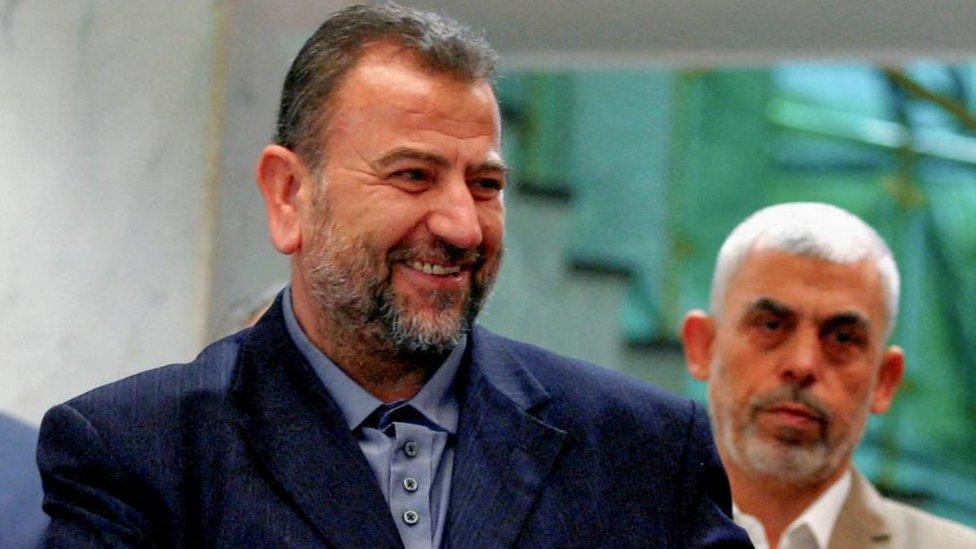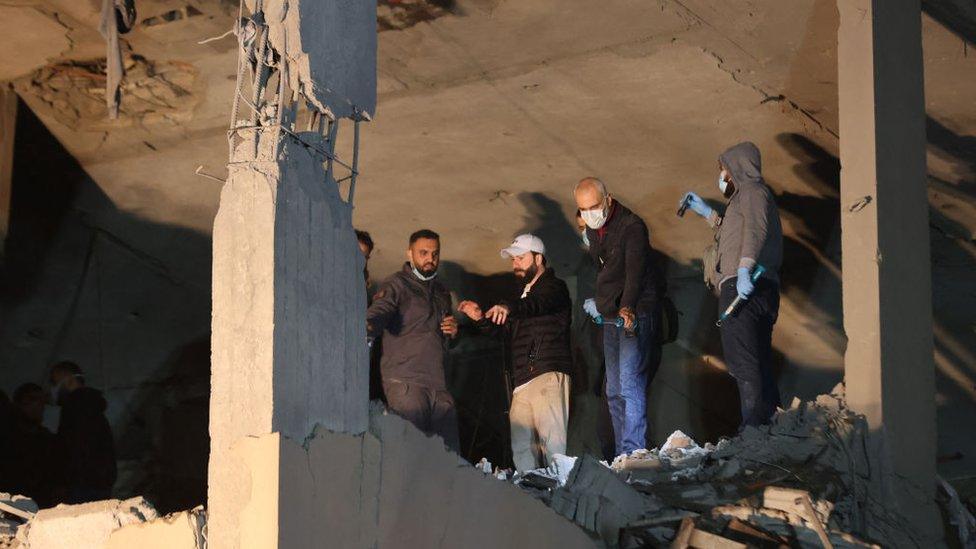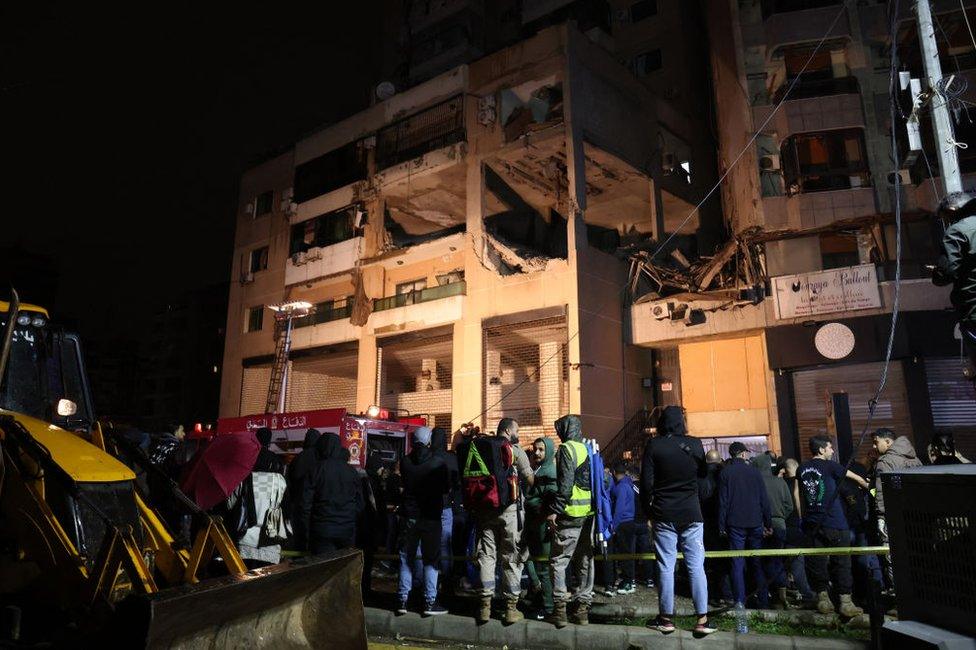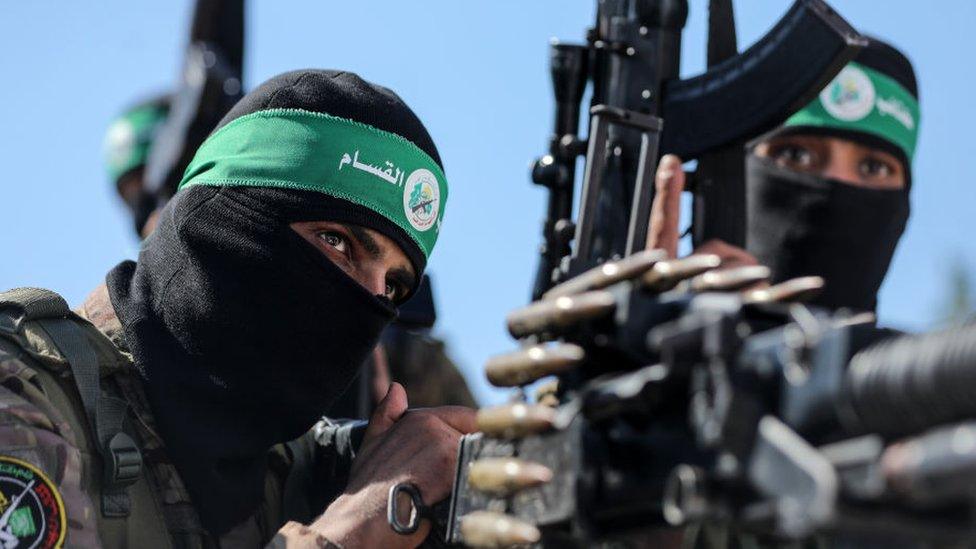Hamas deputy leader Saleh al-Arouri killed in Beirut blast
- Published

Saleh al-Arouri (left) masterminded attacks in the occupied West Bank
Israel has insisted the assassination of a Hamas leader in Beirut was not an attack on Lebanon, as its enemies warned of "punishment" for his death.
Israel has neither confirmed nor denied that it killed Saleh al-Arouri, but a spokesman called it a "surgical strike against the Hamas leadership".
Hamas denounced it as a "terrorist act", while its ally Hezbollah said it was an assault on Lebanese sovereignty.
Lebanon's PM accused Israel of trying to "drag" it into a regional war.
Lebanese media report that Arouri, a deputy political leader of Hamas, was killed in a drone strike in southern Beirut on Tuesday along with six others - two Hamas military commanders and four other members.
He was a key figure in the Izzedine al-Qassam Brigades, Hamas's armed wing, and a close ally of Ismail Haniyeh, the Hamas leader. He had been in Lebanon acting as a connection between his group and Hezbollah.
There have been near daily exchanges of fire between Hezbollah and Israeli forces since the start of the war between Israel and Hamas in Gaza, but so far the violence has been limited to the area along the Israel-Lebanon border.
Hezbollah - which, like Hamas, is considered a terrorist organisation by Israel, the UK and others - is the largest political and military force in Lebanon and has ministers in the country's government.
The Israel Defense Forces (IDF) refused to comment on the assassination of Saleh al-Arouri, but said its troops were "highly prepared for any scenario".
"The IDF is in a very high state of readiness in all arenas, in defence and offence," spokesman Rear Adm Daniel Hagari told a briefing.
"The most important thing to say tonight is that we are focused and remain focused on fighting Hamas," he added.
Israeli government adviser Mark Regev also stopped short of confirming Israel had carried out the attack, but he told MSNBC: "Whoever did it, it must be clear that this was not an attack on the Lebanese state.
"It was not an attack even on Hezbollah, the terrorist organisation.
"Whoever did this did a surgical strike against the Hamas leadership. Whoever did this has a gripe with Hamas. That is very clear."

Lebanese emergency responders at the site of the air strike

Arouri, 57, is the most senior Hamas figure to be killed since Israel went to war with the group after its 7 October attack.
On that day, waves of Hamas gunmen invaded Israel and attacked communities around the border, killing about 1,200 people, mostly civilians, and taking around 240 to Gaza as hostages.
Israel launched a military offensive in response, with the declared aim of destroying Hamas.
Since then, more than 22,000 Palestinians - mostly women and children - have been killed in Israeli strikes on Gaza, according to Gaza's Hamas-run health ministry.
Lebanon's state news agency said Arouri had been killed by an Israeli drone attack on a Hamas office in the southern Beirut suburb of Dahiyeh.
A witness from Reuters news agency saw firefighters and paramedics gathered around a high-rise building where there was a large hole in what appeared to be the third floor.
Video footage on social media showed a car in flames and extensive damage to buildings in what is a busy residential area.
Dahiyeh is known as a stronghold of Hezbollah.
Mr Haniyeh, the leader of Hamas's political bureau, called the attack a "cowardly... terrorist act, a violation of Lebanon's sovereignty, and an expansion of its circle of aggression".
Hezbollah said that it considered Arouri's death "to be a serious assault on Lebanon, its people, its security, sovereignty, and resistance, and the highly symbolic and significant political and security messages it contains".
It said the attack was "a dangerous development in the course of the war... and we in Hezbollah affirm that this crime will never pass without response and punishment".
"Its hand is on the trigger, and its resistors are in the highest levels of readiness and preparedness," it added.
Iran, a major supporter of both groups, said Arouri's killing would "undoubtedly ignite another surge in the veins of resistance".
An Israeli security cabinet meeting scheduled for Tuesday evening to discuss the post-war plan for Gaza was cancelled.
The Lebanese Foreign Minister, Abdallah Bou Habib, told BBC Radio 4 his government was talking to Hezbollah to "impress on them that they should not respond themselves" but that: "We don't tell them, we dialogue with them in this regard."
Over the next 24 hours it will become clear "whether they respond or not", he said, adding: "We are very concerned, [the] Lebanese don't want to be dragged, even Hezbollah does not want to be dragged into a regional war."
And he called on the West to "pressure Israel to stop also all its violence and all of its actions, not only on Lebanon, not only on Beirut, but also in Gaza".
Israeli Prime Minister Benjamin Netanyahu has previously vowed to eliminate Hamas's leaders, wherever they are.
Arouri was also considered the de facto leader of Hamas's military wing in the West Bank, overseeing attacks there, according to Israeli media reports.
He is believed to have been involved in the kidnapping and killing of three Israeli teenagers in the occupied West Bank in 2014, reports say, and had served time in Israeli jails for other attacks.
The Times of Israel says he was also one of the Hamas officials most closely connected to Iran and Hezbollah.
